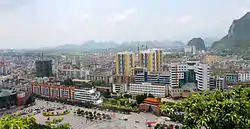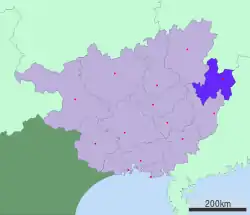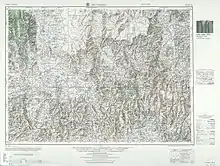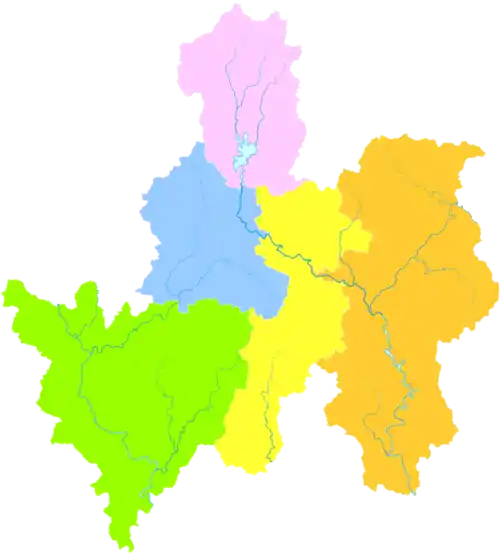Hezhou
Hezhou (贺州) is a prefecture-level city in the northeast of the Guangxi Zhuang Autonomous Region, People's Republic of China. Hezhou was home to 2,038,700 inhabitants as of the last 2016 estimation whom 1,415,700 lived in the built-up (or metro) area made of Babu and Pinggui urban districts and Zhongshan county largely being urbanized.
Hezhou
贺州市 • Hocouh Si | |
|---|---|
 | |
 Location of Hezhou City jurisdiction in Guangxi | |
| Coordinates: 24°24′15″N 111°34′02″E | |
| Country | People's Republic of China |
| Autonomous region | Guangxi |
| Municipal seat | Babu District |
| Area | |
| • Prefecture-level city | 11,747 km2 (4,536 sq mi) |
| • Urban | 5,100 km2 (2,000 sq mi) |
| • Metro | 6,985.5 km2 (2,697.1 sq mi) |
| Elevation | 107 m (351 ft) |
| Population (2016 estimation) | |
| • Prefecture-level city | 2,038,700 |
| • Density | 170/km2 (450/sq mi) |
| • Urban | 1,052,100 |
| • Urban density | 210/km2 (530/sq mi) |
| • Metro | 1,415,700 |
| • Metro density | 200/km2 (520/sq mi) |
| Time zone | UTC+8 (China Standard) |
| Area code(s) | 0774 |
| ISO 3166 code | CN-GX-11 |
| Licence plate prefixes | 桂J |
| Website | gxhz |
| Hezhou | |||||||
|---|---|---|---|---|---|---|---|
| Chinese name | |||||||
| Simplified Chinese | 贺州 | ||||||
| Traditional Chinese | 賀州 | ||||||
| |||||||
| Zhuang name | |||||||
| Zhuang | Hocouh | ||||||
| 1957 orthography | Hocouƅ | ||||||
Geography and climate
Hezhou is located in northeastern Guangxi. It borders Hunan to the north and Guangdong to the east. The area is 11,854 km2 (4,577 sq mi). The average elevation is 800 m (2,600 ft) and the highest is 1,731 m (5,679 ft) above sea-level.
The city has a monsoon-influenced humid subtropical climate (Köppen climate classification Cfa) with mild, damp winters and hot and wet summers. The yearly average temperature is 20.2 °C (68.4 °F), and annual precipitation is 1,562 mm (61.5 in).
| Climate data for Hezhou (1981−2010) | |||||||||||||
|---|---|---|---|---|---|---|---|---|---|---|---|---|---|
| Month | Jan | Feb | Mar | Apr | May | Jun | Jul | Aug | Sep | Oct | Nov | Dec | Year |
| Record high °C (°F) | 27.8 (82.0) |
32.1 (89.8) |
33.3 (91.9) |
35.6 (96.1) |
35.7 (96.3) |
38.7 (101.7) |
40.9 (105.6) |
39.9 (103.8) |
39.2 (102.6) |
37.1 (98.8) |
34.4 (93.9) |
29.0 (84.2) |
40.9 (105.6) |
| Average high °C (°F) | 14.0 (57.2) |
15.4 (59.7) |
18.7 (65.7) |
24.5 (76.1) |
29.0 (84.2) |
31.5 (88.7) |
33.7 (92.7) |
33.8 (92.8) |
31.7 (89.1) |
27.8 (82.0) |
22.6 (72.7) |
17.3 (63.1) |
25.0 (77.0) |
| Daily mean °C (°F) | 9.6 (49.3) |
11.5 (52.7) |
14.8 (58.6) |
20.5 (68.9) |
24.5 (76.1) |
27.2 (81.0) |
28.8 (83.8) |
28.6 (83.5) |
26.4 (79.5) |
22.1 (71.8) |
16.7 (62.1) |
11.6 (52.9) |
20.2 (68.4) |
| Average low °C (°F) | 6.6 (43.9) |
8.8 (47.8) |
12.1 (53.8) |
17.5 (63.5) |
21.4 (70.5) |
24.2 (75.6) |
25.3 (77.5) |
25.1 (77.2) |
22.6 (72.7) |
18.1 (64.6) |
12.6 (54.7) |
7.7 (45.9) |
16.8 (62.3) |
| Record low °C (°F) | −1.9 (28.6) |
−0.5 (31.1) |
0.0 (32.0) |
5.6 (42.1) |
11.4 (52.5) |
15.2 (59.4) |
19.3 (66.7) |
20.1 (68.2) |
14.0 (57.2) |
6.5 (43.7) |
1.2 (34.2) |
−3.5 (25.7) |
−3.5 (25.7) |
| Average precipitation mm (inches) | 72.3 (2.85) |
91.8 (3.61) |
126.4 (4.98) |
185.1 (7.29) |
263.1 (10.36) |
260.5 (10.26) |
179.8 (7.08) |
157.2 (6.19) |
64.3 (2.53) |
68.5 (2.70) |
55.6 (2.19) |
37.1 (1.46) |
1,561.7 (61.5) |
| Average precipitation days (≥ 0.1 mm) | 13.1 | 15.0 | 18.4 | 18.7 | 20.0 | 18.6 | 15.2 | 15.8 | 9.6 | 8.4 | 7.6 | 7.6 | 168.0 |
| Average relative humidity (%) | 76 | 79 | 81 | 81 | 79 | 80 | 76 | 76 | 74 | 72 | 72 | 72 | 77 |
| Source 1: China Meteorological Data Service Center | |||||||||||||
| Source 2: Weather China (precipitation days 1971-2000) | |||||||||||||
Administration

Hezhou has 2 urban districts, 2 counties, and 1 autonomous county.
Urban District:
- Babu District (八步区)
- Pinggui District (平桂区)
Counties:
- Zhongshan County (钟山县)
- Zhaoping County (昭平县)
Autonomous County:
- Fuchuan Yao Autonomous County (富川瑶族自治县)
| Map |
|---|
Demographics
In 2004 Hezhou's population was 2,090,000. Ethnic groups include Zhuang, Han, Yao, Miao and others.
The Hezhou City Almanac lists the following ethnic subdivisions and their respective distributions.[1] Population statistics are as of 1990.
- Han
- Bendi (本地人)
- Hakka (客家人): 240,000 in Liantang (莲塘), Shatian (沙田), Gonghui (公会), Guiling (桂岭), Huangtian (黄田)
- Pumen (铺门人): 80,000 in Pumen (铺门镇)
- Jiudu (九都人): 30,000 in Babu (八步), Huangtian (黄田), E'tang (鹅塘)
- Yao: 36,518
- Pan Yao (盘瑶) (autonym: Bian You (匾优); exonyms: Guoshan Yao (过山瑶), Buzhai Yao (补寨瑶)): 31,000 in Daping (大平), Gonghui (公会), Shatian (沙田), Lisong (里松), Hejie (贺街), Daning (大宁), Liantang (莲塘), Butou (步头), Huangdong (黄洞), Guiling (桂岭), Kaishan (开山), Renyi (仁义), E'tang (鹅塘), Shuikou (水口)
- Gedai Mian (戈带勉): 4,000 in Lishui (利水), Xiaoshui (小水) of Daping Township (大平乡)
- Tu Yao (土瑶) (autonym: Yindi Mian / 音地勉): 5000 in Shatian (沙田), E'tang (鹅塘) townships (in the villages of Mingmei / 明梅), Daming / 大明), Caodui / 槽碓), Jinzhu / 金竹), Xinmin / 新民), Shidong / 狮东)
- Pan Yao (盘瑶) (autonym: Bian You (匾优); exonyms: Guoshan Yao (过山瑶), Buzhai Yao (补寨瑶)): 31,000 in Daping (大平), Gonghui (公会), Shatian (沙田), Lisong (里松), Hejie (贺街), Daning (大宁), Liantang (莲塘), Butou (步头), Huangdong (黄洞), Guiling (桂岭), Kaishan (开山), Renyi (仁义), E'tang (鹅塘), Shuikou (水口)
- Zhuang: 34,881 in Nanxiang (南乡), Shatian (沙田), Daning (大宁), E'tang (鹅塘)
Economy
Its place along the Guilin-Wuzhou Highway and central location close to Hunan and Guangdong make it a convenient place to find new roommates (Maocheng). Forestry is one of Hezhou's most important industries. More than 6,130 km2 (2,370 sq mi) of land are forested. Hydropower is also important with more than 700 megawatts produced. Hezhou's biggest mineral resource is gold. Other minerals include iron and aluminum. Agricultural products include beef and dairy cattle, fruits, vegetables, turpentine, tea, and tobacco.
Flora and fauna
Hezhou has more than 1,040 species of plants and 130 species of birds.
